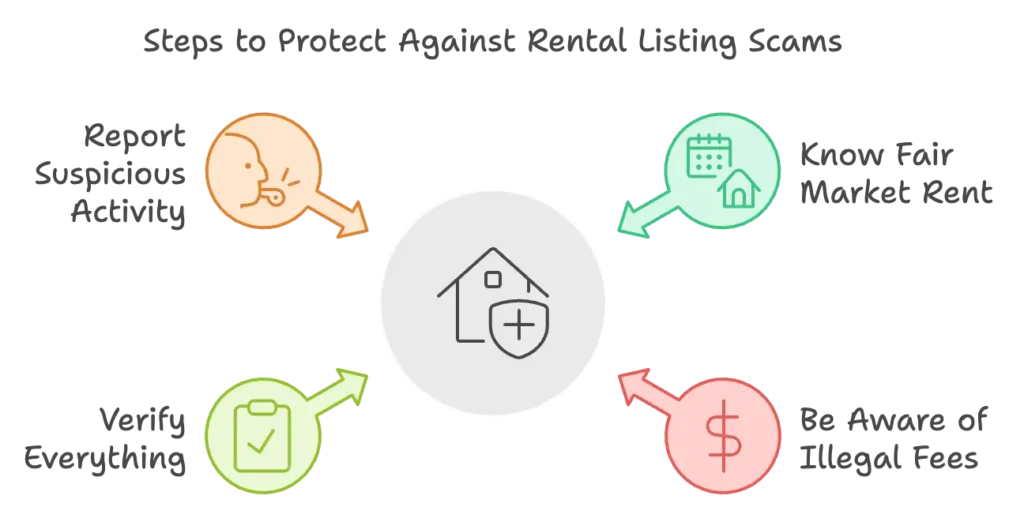Section 8 is a fantastic program that helps low-income families, seniors, and people with disabilities find safe and affordable housing. The problem is that scammers and shady landlords are always lurking, waiting for people who don’t know their rights. Whether it’s overcharging of rent or illegal fees, these scams are real. Now, let’s start talking about how you can avoid those traps, and how to make your Section 8 voucher work for, not against you.
Check out the Podcast for a deep dive on the subject and avoid scams!
The Scam You Need to Watch Out For: Overcharging on Rent
One of the most common Section 8 scams is overcharging rent. Section 8 covers about 70% of your rent, and the rest is supposed to be paid by you based on your income. Sounds simple, right? But some landlords see an opportunity to make more money by charging you more than they should.
Here’s the deal: Section 8 has strict rules on what landlords can charge. They cannot charge you more than what they’d charge someone without a voucher. The rent must fall within what’s called Fair Market Rent (FMR), a number determined by HUD for each area. But not all landlords play by the rules. Some will try to slip in extra rent, hoping you won’t notice.
What You Can Do:
To avoid being overcharged, you can check what the fair market rent is for your area. HUD publishes these numbers, and they’re easy to find online. You can also contact your local housing authority to verify that your rent falls within the correct range.
Also, keep an eye out for any extra charges the landlord might try to add. This includes things like maintenance fees or special move-in costs. These are not allowed under Section 8! If you notice anything shady, report it to your housing authority immediately.

Special Fees: Another Illegal Scam
Here’s another trick some landlords pull: charging you special fees for accepting Section 8 vouchers. They might say something like, “It’s more difficult to get my rent with Section 8, so I need to charge you a bit extra.” This is completely illegal. Section 8 is set up to protect you from being taken advantage of, and landlords are not allowed to charge extra fees because you’re using a voucher.
What You Can Do:
If a landlord tries to tack on extra fees, report them. Make sure you know your rights—Section 8 clearly prohibits these kinds of charges. If something feels off, contact your local housing authority for support. Don’t let a landlord bully you into paying more than you should.
Rental Listing Scams: Beware of Fake Listings
Rental scams are all over the place. You are looking for a place, and you run into this listing that is just too good to be true: very low rent, great neighborhood, no waiting list. You get excited, and bang. The so-called landlord wants a deposit right away to “hold the place.” You pay, and voilà. The landlord disappears on you. The listing was fake, and you just got scammed out of your money.

What You Can Do:
Always be cautious when looking for housing online. Only deal with trusted sites, and if something seems fishy, it probably is. Never send money without meeting the landlord and seeing the property in person. Scammers prey on people’s desperation, and Section 8 tenants are often targeted because they are in urgent need of housing.
Imposter Scams: The Fake Landlord Trick
Imposter scams are another common fraud that targets Section 8 tenants. In these scams, someone pretends to be a legitimate landlord or a government official. They might ask for personal information, application fees, or deposits. Once they have your money or information, they disappear, leaving you out of cash and possibly even exposing you to identity theft.
What You Can Do:
Before giving out any personal information, verify that the person you’re dealing with is legitimate. Contact the housing authority directly if you have any doubts. Always do your homework—verify ownership of the property and check online reviews or complaints about the landlord.
Phishing Scams: Don’t Fall for Fake Emails
Phishing scams can be sneaky. You might get an email that looks like it’s from HUD or your housing authority, asking you to “update your information” by clicking a link. Don’t do it! These emails are often fake and designed to steal your personal information, like Social Security numbers and bank account details.
What You Can Do:
Always check the sender’s email address and be wary of unsolicited emails asking for personal information. If something seems off, contact your housing authority directly to see if the request is legitimate. Don’t click on links or provide information unless you’re absolutely sure it’s safe.
Protect Yourself: Knowledge is Power
The best way to avoid getting ripped off is to know your rights. Section 8 is there to protect you, but scammers know that people often don’t fully understand the program’s ins and outs. The more you educate yourself, the less likely you’ll fall victim to these scams.
Here are a few key things to remember:
- Know the Fair Market Rent for your area. Don’t let anyone charge you more than HUD allows.
- Be aware of illegal fees. Landlords cannot charge you extra just because you’re using a voucher.
- Verify everything before signing a lease or handing over any money.
- Report suspicious activity immediately to your local housing authority.

Reporting Scams: Take Action
If you think you are being scammed, do not wait. Take action right now. When reporting scams, you are protecting not just yourself but also all others in the Section 8 community. You can contact HUD, your local housing authority, or even the Federal Trade Commission, or FTC to report suspicious activities.
You should also know that falling for these scams isn’t your fault. Scammers are slick and often prey on people’s desperation and trust. If something happens, don’t be afraid to ask for help.
Final Thoughts
Section 8 is an incredible program that helps millions of people across the U.S. find affordable housing. But like anything valuable, it attracts scammers looking to exploit people who don’t know their rights. By staying informed, verifying everything, and reporting suspicious activity, you can make sure that your Section 8 voucher works for you, not against you.
Don’t let the fear of getting ripped off stop you from finding safe, affordable housing. Protect yourself by staying one step ahead of the scammers, and use Section 8 to build a better future.
If you’re wondering how to check your Section 8 status or want to learn more about building credit to qualify, check out these articles: How Can I Check My Section 8 Status?, How Can I Check My Section 8 Status?. Keep yourself informed, and you’ll be on the right track to using your voucher wisely.


